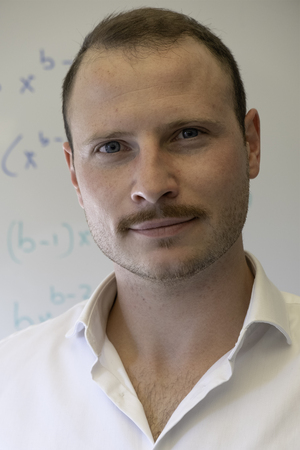About
I am a postdoctoral researcher in the Mathematics for Materials Modelling (MatMat) group at EPFL Lausanne, where I focus on applying Bayesian Optimization to discover new materials.
More broadly, I also work on quantifying uncertainties in quantum chemistry calculations (particularly DFT).
I obtained my PhD in statistics from the University of Bern in June 2023 under the supervision of Prof. David Ginsbourger, writing a thesis on how to use machine learning to guide data acquisition pocesses in the natural sciences.
After my PhD, I worked as an assistant researcher for the Oeschger Center for Climate Change Research, developing distributed computing algorithms for paleoclimate reconstructions.
Before my PhD, I obtained an MSc in Physics (Hons.) from ETH Zürich and worked as a data scientist at SwissRe and as a quantitative risk consultant at Deloitte.
News
I have been awarded theMoser Preis 2023 of the Statistics Institute of the University of Bern for my PhD thesis.
I have a new preprint online about using distributed computing for Ensemble Kalman Filtering with applications to paleoclimate reconstruction.
Research Interests
Bayesian Inverse Problems
https://doi.org/10.48550/arXiv.2109.03457
Most existing probabilistic inversion techniques have been demonstrated on toy models but tend to scale poorly when applied to real-world problems. My aim is to overcome these limitations, by focussing on two research directions:
- Large-scale inversion Bayesian inversion on large 3-dimensional domains exhibits an exploding memory footprint that limits the achievable resolution. By introducing new ways of looking at posterior covariance matrices of Gaussian processes (GP), our team was able to scale GP-based inversion to large, realistic inverse problems such as gravimetric inversion for volcanoes.
- Realistic priors
Sequential Uncertainty Reduction
https://doi.org/10.1214/21-AOAS1451
Sequential uncertainty reduction (SUR) strategies aim at computing data collection plans that optimally reduce the uncertainty on a given quantity of interest. During my PhD, I have worked on developing SUR strategies for set estimation in large-scale inverse problems. I have also worked on extending these strategies to multivariate set estimation problems. Currently, my research focuses on making the data collection plans proposed by SUR more realistic, by including travel costs, location-specific penalties and global constraints.
Distributed Computing for Large Covariance Modelling
https://arxiv.org/abs/2311.12909
When working with probabilistic models discretized on a grid, covariance matrices grow quadratically in the grid size. While this used to call for approximations scheme, with the avent of cloud-, distributed-computing, researchers are now able to handle the covariances on large grids without approximations.
By leveraging state-of-the-art techniques from distributed computing, we build algorithms for large-scale data assimilation (Ensemble Kalman Filter) and for estimation of large covariance matrices; demonstrating how these can be used in climatology and paleoclimate reconstruction.
